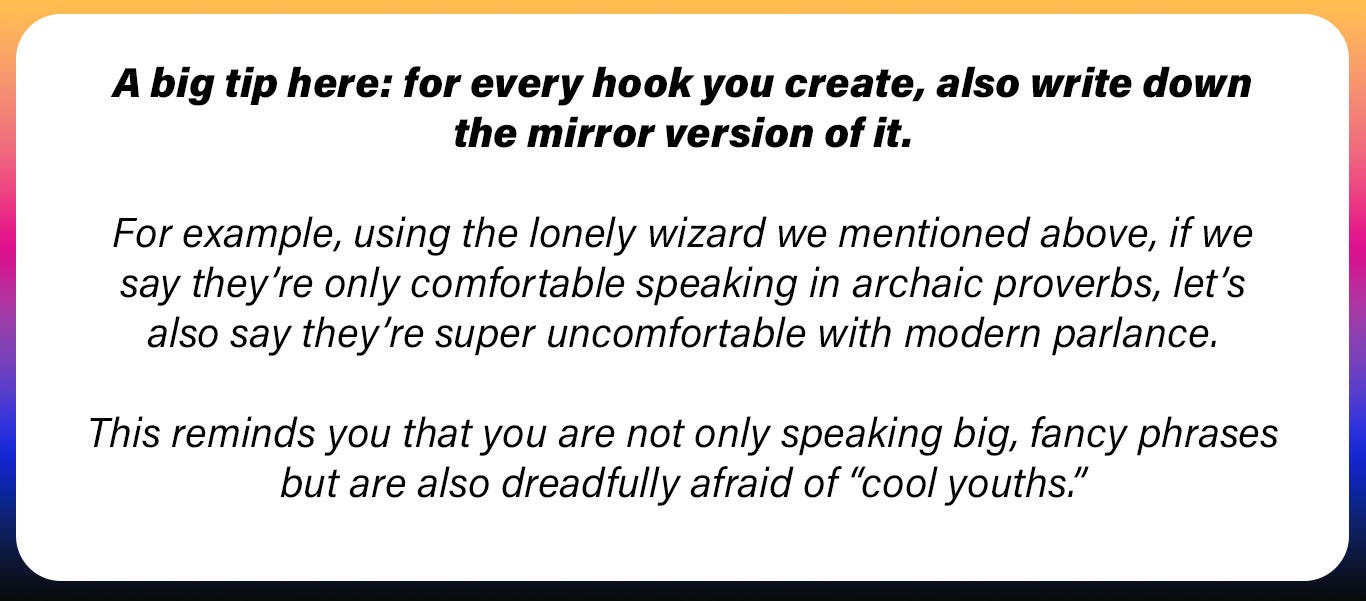The Future of RPGs is Pregenerated Characters
Players disengaged? It might be all that character creation 'homework' holding them back.
A fascinating trend has been rising in the RPG space for the past couple of years: the return of the pregen.
A pregen (pre-generated character) is created by the adventure, setting, or campaign designer rather than the player. They may even be made by the GM of a home group to facilitate better what the setting expects the players to come across.
I’m not sure about you, but pregens have always had this sort of negative connotation with me - as if they’re the “newbie” or “quick” version of a more robust and rewarding system. Picking a pregen always felt like taking the easy way out, like you didn’t want to spend time thinking of your character’s place in the world.
But recently, I’ve been exposed to tons more games outside the narrow view of fantasy elf games and into more experimental titles. Games like Yazeba’s Bed and Breakfast by Possum Creek Games, Eat the Reich by Rowan, Rook & Decard, and Alice is Missing by Hunters Entertainment all have pre-generated characters for players.
My prediction? We’re only going to see more of them. And that’s a good thing.
If you’ve played in RPGs long enough, chances are, you’ve had the opportunity to pick and play as a pregen in a game. But, if I had to guess, you probably did so in a one-shot, convention, or similar situation where you don’t have time to sit down and spend a session making characters that actually like each other.
I will assume further that these were pregens in a fantasy elf game, like Dungeons & Dragons.
In those situations, most (not all) of the time, the pregens are just class packages. The cleric has a few personality traits that feel cleric-y, the wizard has all his fancy orbs and shit, and the rogue has a shopping cart’s worth of random equipment just rattling around in his 40lb backpack. They often don’t describe why this pregen is here in this particular adventure or why they’re working with this particular party of people.
These pregens fall flat because they remove one of the more fun aspects of the character creation process (modifying your kit/build) and leave you to do all the hard, relatively unrewarding work (figuring out how your character fits into the game, their backstory, their connection to the other characters at the table, etc.).
Many of your choices here don’t appear in the first few sessions — if they appear at all over a larger campaign. This is even more egregious in one-shots and convention games because it’s often completely ignored for the sake of time. You very rarely discover who was responsible for the murder of your clan in a one-shot session, for example.
Suffice to say, having a pregen be a bundle of equipment, spells, and other premade gameplay choices is not enough. They need to be full characters so that when a player picks the pregen, they can immediately see how the character fits into the adventure at large. They should know why their character is here, who they may run into that can change the course of the adventure, and most importantly, a rich and evocative sense of how to roleplay this character.
Take, for example, Gertrude from Yazeba’s Bed and Breakfast:
You immediately know what Gertrude’s deal is: she’s a moody, introverted teenager who ultimately wants to feel accepted. There are plenty of little hooks here that you can have surface through play. The character practically jumps off the page and you’re not left wondering what’s missing.
Yazeba’s isn’t a game about huge equipment lists or anything like that, but even if you were trying to track stuff along those lines, it would be a relatively easy task compared to having to come up with what’s already on Gertrude’s character sheet.
So what actually makes a good pregen? We can boil it down to the following:
A Concrete Reason for Being in the Game
Every character should have a clear, built-in motivation or backstory hook that ties them directly to the story, setting, and other PCs. Instead of the generic “just passing through,” it’s more interesting if your pregen’s background has them searching for a lost heirloom, seeking revenge on a rival, or avoiding a tumultuous home life. This makes it easier for the player to jump into roleplay with genuine purpose.
Clear Connections to Other Characters
A compelling pregen establishes at least one friendly, antagonistic, or complicated relationship with one or two others in the party (or the setting). This helps players hit the ground running: they already know who their rivals or allies might be, and it gives the GM ready-made conflicts and alliances to play off of.
Distinct Roleplaying Hooks
A good pregen shows you how to portray them in a living, breathing way. Maybe the wizard is a lonely archivist who’s only comfortable speaking in archaic proverbs. Or a risk-taker who uses big magic to compensate for low self-esteem. These personality cues help the player navigate interactions without feeling like they’re flailing around to find a voice for their character.
A Sense of Growth or Change
Even if it’s just a one-shot, it’s nice to have a “next step” or subtle arc built into the pregen. Maybe they’re on the cusp of reconciling a secret guilt or forming a new worldview. Even if it doesn’t fully come to fruition in short play, these seeds can blossom if the campaign continues or if a single session runs longer than expected. It also gives players something to latch onto beyond their immediate stats and abilities. Whatever it is, make it short and simple - there will always be more time to create bigger problems.
Players feel excited to pick up the pregen when these elements come together rather than resigned to it. They’re not just signing up for someone else’s static creation; they’re stepping into a character that has a reason to exist, a reason to cooperate (or clash) with the rest of the group, and a roadmap for how they might evolve over the course of the story.
Most importantly, a well-made pregen doesn’t punish the player by making them do all the “hard” bits — like deep backstory and relationship-building — while removing the mechanical customization they might want. Instead, it bakes those narrative pieces into the sheet, giving them a functional blueprint for who the character is and why it matters.
We see more and more pregens in indie and experimental games, and I suspect even the “big publishers” will follow suit sooner rather than later. By eliminating the empty or tedious aspects that sometimes accompany character creation, we leave room for the best parts—compelling roleplay, dynamic story arcs, and immediate immersion in the fictional world.
If you ask me, that’s the opposite of a “newbie” option. It’s the next natural step in roleplaying to more narrative-rich heights.

This article is brought to you by the following paid subscribers who make this newsletter possible:
Azzlegog
Colin
Michael Phillips
Mori
Space Pirate









I like pre gens especially if I’m getting to know a game. For instance, I got the Pendragon starter set for Xmas. It came with great choices of pre gens and I’m really happy with them. It has enough info for me to build upon and I can focus on learning g the mechanics of the game first.
I only use pretend for brand new players or at a convention. My experiences over the years was people hate pregens and sometimes even newbie players groaned at them. But everyone’s experience may vary